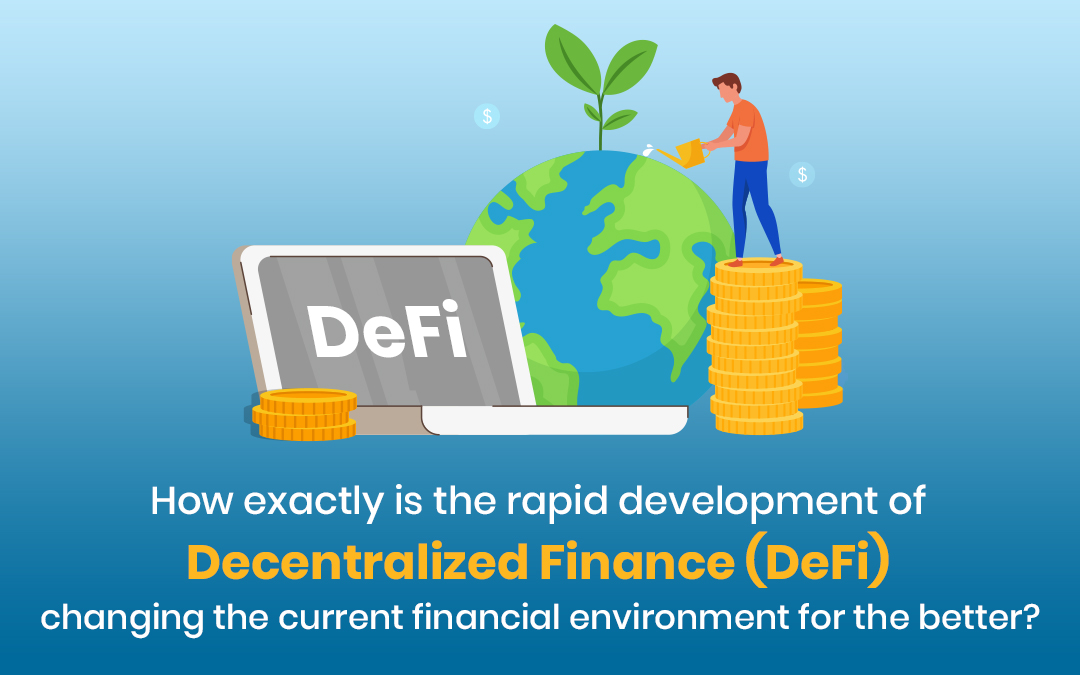
In recent times, the modern industry of financial technologies has undergone significant changes, various processes have taken place in it, which have significantly changed it and made this industry more client-oriented. Decentralized finance (DeFi) has become one of the key sectors that have undergone positive changes. DeFi refers to a field that actively uses blockchain technology to accurately replicate and maximize traditional financial systems, allowing for peer-to-peer transactions without any intermediaries such as banks or brokers. Companies offering financial & banking software development services are increasingly in demand as the industry seeks innovative solutions to improve efficiency and customer experience. This article examines the process of change in the DeFi sector, its key components, undeniable benefits and challenges, and its future potential in the broader financial environment.
Understanding the DeFi phenomenon. What is decentralized finance?
Decentralized finance or DeFi is a key way of financial interaction thanks to special applications developed based on the blockchain network. In addition, the term refers to a socio-economic movement that aims to gradually move away from traditional financial interactions through intermediaries to a simpler, faster, and more transparent way of interacting with finances. This includes reducing the potential for government intervention in providing financial services. Currently, this interaction is provided by decentralized multifunctional programs.

Smart contracts are the key foundation of DeFi.
Many applications related to decentralized finance are based on a system of smart contracts. This is a special computer code that works completely automatically and independently only under certain conditions. This allows a large number of parallel processes to be processed simultaneously, increasing the overall bandwidth of DeFi networks.
However, this method has its drawbacks: if the smart contract is not properly designed from the beginning, there is a possibility of abuse. In addition, all software code can contain vulnerabilities and bugs, opening up many opportunities for abuse by hackers.
Areas of application of DeFi
Crypto Loans and credits. DeFi means that anyone can join the credit system. The advantages are obvious: low interest rates, since the intermediary does not have a monopoly or desire for additional profit, the possibility of working with cryptocurrencies, high speed of transactions, and no credit history check. The use of cryptographic processes and automated smart contracts ensures the timely repayment of loans.
Insurance and mortgage. There is a very effective way to solve the problem of cryptocurrency volatility: stablecoins tied to real financial assets. It is almost ordinary money, only its issuance is automated and there is no state control. You can interact with these stablecoins using traditional financial methods. But with significantly fewer intermediaries, simplified rules, and less risk. It is easier, faster, and cheaper to issue a mortgage and insurance.
Decentralized markets. In particular, we are talking about decentralized exchanges that allow you to make calculations only between the wallets of individual users, without the need to store assets on the exchanges themselves. This reduces the commission amount and speeds up the process. The transactions themselves are partially automated using smart contracts, which significantly increases their reliability.
Ability to work with securities. DeFi can also be used with traditional financial instruments. For example, some private security token platforms allow their issuers to issue tokenized securities. In addition, it is possible to work with synthetic instruments, prediction markets, derivatives, and various key financial interaction tools.
The key components that make up the DeFi phenomenon
DeFi consists of completely different components that together create a comprehensive, secure financial ecosystem that works to ensure an adequate level of security and to meet the needs of customers. Let's consider these components in more detail, and describe the key principles of their operation:
- Decentralized exchanges provide an efficient opportunity for users to trade cryptocurrencies without the participation of intermediaries using automated market-making (AMM) algorithms;
- Lending and borrowing protocols, such as Aave and Compound, provide an efficient way for users to borrow cryptocurrencies in a trustless environment, allowing participants to earn interest on their assets;
- Stablecoins, such as DAI and USDC, are pegged to stable assets (such as the US dollar) to reduce volatility and facilitate transactions in the DeFi ecosystem;
- Yield Farming and Liquidity Mining incentivize users to provide liquidity to DeFi protocols in exchange for a reward, often in the form of their tokens;
- Insurance protocols offer users decentralized insurance solutions that allow them to protect themselves against potential risks that may arise in the DeFi space;
- Derivatives and synthetic assets allow close tracking of the current value of real assets, allowing users to trade derivatives without the need for centralized control.
Understanding the different types of core banking systems is essential for financial institutions looking to enhance their operational efficiency and customer service.
The benefits of DeFi are quite significant. Let's consider them in more detail.
Affordability is one of the key benefits of DeFi. Traditional financial systems often exclude individuals without bank accounts or a good credit history. DeFi, on the other hand, only requires an internet connection and a cryptocurrency wallet, making financial services available to anyone, anywhere.
Transparency is another undeniable advantage of decentralized finance. DeFi runs on public blockchains, allowing anyone to verify transactions and smart contracts. Full transparency promotes trust and accountability, as users can verify the operation of protocols and the integrity of their funds.
By eliminating middlemen, DeFi significantly reduces transaction fees and overhead. Users can make transactions, borrow funds, or borrow assets with minimal fees, increasing the efficiency of financial transactions.
What is the future of DeFi?
As DeFi evolves, we can see it becoming more integrated with traditional financial systems. Financial institutions can diligently explore partnerships with DeFi protocols, offering consumers new investment opportunities using blockchain technology to improve efficiency and ensure maximum transparency. The future of DeFi lies in productive collaboration between different blockchain networks. Such solutions allow users to seamlessly move assets between different platforms, creating a more cohesive DeFi ecosystem. Regulatory uncertainty is a pressing issue, and clearer rules can increase trust and legitimacy in the DeFi space. By setting guidelines, governments can encourage innovation while protecting consumer rights.
By providing access to financial services to unbanked and resource-constrained populations, DeFi can empower people and drive economic growth in underserved areas. The future of DeFi could provide new, key uses for the financial realm outside of its traditional vision. Areas such as decentralized identity and real estate tokenization are likely to become integral parts of the DeFi landscape.
Summarizing all of the above
Decentralized finance represents a revolutionary change in the current ways individuals and companies interact with financial systems. Using blockchain technology, DeFi improves accessibility, transparency, and efficiency while reducing reliance on traditional intermediaries. However, DeFi faces significant challenges, including security risks, regulatory uncertainty, and scalability issues.
Nowadays, the DeFi ecosystem continues to actively and rapidly develop, it has a huge potential to make effective changes in the field of the financial landscape. With greater integration with traditional finance, better interoperability, and a focus on user interaction, DeFi can play one of the most important roles in effectively shaping the future of finance, driving innovation, and promoting financial inclusion.
Share this post
Leave a comment
All comments are moderated. Spammy and bot submitted comments are deleted. Please submit the comments that are helpful to others, and we'll approve your comments. A comment that includes outbound link will only be approved if the content is relevant to the topic, and has some value to our readers.

Comments (0)
No comment